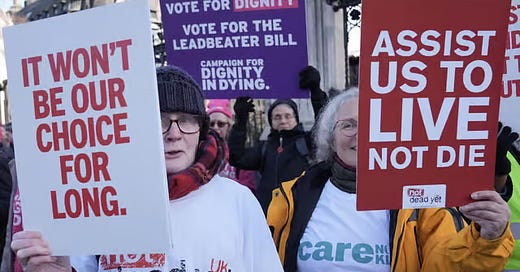I Had No Idea This Country Had the Highest Assisted Death Rates
and chances are neither did you.
Here's a statistic that caught me completely off guard: if you had to guess which country has the highest rates of medically assisted dying, what would your answer be? Because I certainly didn't see this one coming.
This question has become pretty relevant now that the UK is considering a new end-of-life bill that would allow terminally ill adults to request assistance in ending their own lives. But here's where it gets uncomfortable - one of the main selling points seems to be that it could save the NHS around £60 million.
(If you’re coming from social media - you can skip towards the end for the status of End of Life bills in the United States!)
When Money Enters the Conversation
That financial aspect has disability advocates genuinely worried. There's this real concern that people with disabilities might start being viewed as expensive burdens on an already stretched healthcare system, especially since the current bill doesn't have strong enough protections against coercion or pressure from families.
Penny Batchelor, who was born with a rare genetic bone disorder, has been speaking out about how this legislation doesn't adequately protect disabled people. Her concerns make total sense when you look at what happened during COVID - it was discovered that "do not resuscitate" orders were placed on patients' records without their consent. That's genuinely disturbing.
The Problem with Vague Guidelines
The bill is also pretty unclear about which conditions would actually qualify. Ailidh Musgrave's story really drives this point home. In 2019, severe anorexia nearly killed her, and she says the only thing that kept her alive was her mom's encouragement to keep going. She told lawmakers that if assisted dying had been available back then, she probably would have used it - which terrifies her now because she's in recovery and living "a more amazing life than I ever dreamed possible."
Her testimony actually led to changes in the bill to specifically exclude anorexia and make it illegal to encourage someone to seek assisted death. But it raises this bigger question about the “slippery slope effect” - what happens when these laws start expanding beyond their original intent?
So, What's the Answer?
Back to my original question - which country leads in medically assisted deaths?
[Thank you for reading this far! Consider becoming a paid subscriber to support Today I Learned Science to receive articles like this, Substack only podcasts and expert interviews all at your fingertips! ]
Keep reading with a 7-day free trial
Subscribe to Today I Learned Science to keep reading this post and get 7 days of free access to the full post archives.




